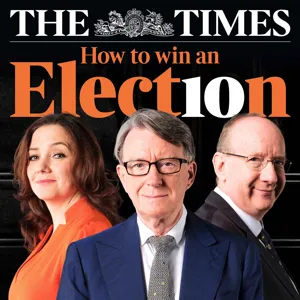Podcast Summary
Mint Mobile Reduces Price for Unlimited Data, Labour Party Leader Tries Humor: Mint Mobile offers unlimited data for $15 a month, Labour Party leader Keir Starmer uses humor at Prime Minister's Questions to engage with the public
Despite big wireless companies being allowed to raise prices due to inflation, Mint Mobile is reducing its price for unlimited data from $30 to $15 a month. This is an exciting offer for new customers at Mint Mobile, and the company is encouraging people to try it out at mintmobiledot.com/switch. In the world of politics, Keir Starmer, the Labour Party leader, has been making an effort to engage with the public through humor at Prime Minister's Questions. While some may argue that his jokes are terrible, Peter Manson, a new Labour Mastermind, believes that Starmer's attempts to lighten the mood are a good sign and can help cheer people up during difficult times. However, it's important for political figures to ensure their jokes are well-received and not poorly executed, as Matt Chorley, a journalist, learned the hard way when he had to admit that he wrote both a poorly received joke told by Theresa May and the jokes that were used to criticize it. Overall, whether it's in business or politics, finding ways to connect with people and bring joy can make a significant impact.
Jokes in Politics: More Than Just Being Funny: Jokes in politics can impact public perception, morale and have ethical considerations. Effectiveness depends on context, spontaneity and delivery.
The effectiveness of a joke depends heavily on the context and the spontaneity of its delivery. Jokes told by politicians can have significant impact, especially during high-pressure situations like Prime Minister's Questions. However, if a joke seems too rehearsed or prepped, it can fall flat. Ethical considerations also come into play when it comes to joke writing for politicians. While it may be acceptable to help write jokes for them after a certain period with their permission, revealing the authorship beforehand can be problematic. Ed Davey, for instance, is known for his sincerity and may not be the most effective joke teller. But even in such cases, jokes can still work due to the context and the audience's expectations. For example, a joke with a missing punchline that is delivered in the expected place can still bring the house down. Overall, jokes in politics serve a purpose beyond just being funny and can play a crucial role in shaping public perception and morale.
Effective Political Humor: Building Camaraderie and Aligning with Electoral Strategy: Political humor can build camaraderie within a party and resonate with the public when aligned with electoral strategy. Memorable sound bites demonstrate wit, intelligence, and confidence, but should not be insulting or derogatory towards opponents.
Political humor, such as the visual jokes used by a particular politician, can be effective in building camaraderie and loyalty within a political party. However, it's not just for the amusement of the in-group. The best political jokes are memorable sound bites that resonate with the public and align with the party's electoral strategy. It's important that these jokes are not insulting or derogatory towards opponents, but rather demonstrate the politician's wit, intelligence, and confidence. While the intention is to make the politician appear sharp and humorous, it can backfire if the jokes fall flat or if the politician lacks a genuine sense of humor. As seen in the example of Nixon and Sorensen, even a supposedly witty joke can have unintended consequences if it's not authentic.
Using Political Jokes in Speeches: Political jokes can make speeches more engaging and memorable, but it's crucial to choose appropriate ones. Sharing jokes within political circles can provide valuable material.
Political jokes can significantly enhance conference speeches, making them more engaging and memorable. However, not all jokes are suitable for political use, as some may undermine the intended message or be inappropriate. Sometimes, politicians receive jokes from external sources, requiring them to adapt and deliver them effectively. Sharing jokes within political circles, like between William Hague and Ken Dodd or Nick Clegg and Sandy Toksvig, can lead to a wealth of material. Successfully incorporating these jokes into speeches can help lighten the mood and keep audiences engaged.
Political jokes hold significant value in politics: Political jokes can help politicians show resilience, diffuse tensions, and move on from controversies by connecting with their audience and bringing humor to serious situations
Political jokes, while seemingly simple and often not funny when taken out of context, can hold significant value in politics. They can help politicians show resilience during tough situations, diffuse tensions, and move on from controversies. The effectiveness of these jokes lies in their ability to connect with the audience and bring a sense of humor and lightness to serious situations. For instance, Tony Blair's "two mayors" joke during his juggling between Ken Livingstone and Frank Dobson for the London mayoral race worked at the time due to the context. Similarly, Blair's joke about his wife not running off with the guy next door after his wife was overheard badmouthing Gordon Brown helped calm the tension between them. These jokes not only show the politicians' ability to handle criticism but also demonstrate their quick wit and connection with their audience. Ultimately, political jokes can be an essential tool in politics, helping to build rapport, defuse tensions, and move on from controversies.
Political humor that works best combines truth and surprise: Effective political humor arises from unexpected observations or plays on words that are true to the political climate
Effective political humor arises from a combination of truth and surprise. Adlai Stevenson's quips about not having a majority despite intelligence on his side, and Michael Heseltine's pun on Gordon Brown's transformation, were successful due to their political relevance and unexpected nature. Vince Cable's joke about Gordon Brown's transformation from a "clunking fist" to a "silent comedy mime" was also effective because it was unexpected and true to Cable's character. The most memorable political humor often catches audiences off guard with a clever observation or play on words that resonates with the political climate.
Political Humor as a Tool for Deflection and Morale Boosting: During intense political competition, leaders like William Hague used humor as a strategy to deflect attacks, boost morale, and leave opponents struggling to respond effectively.
During the time of intense political competition between Tony Blair's Labour Party and William Hague's Conservative Party, the use of humor as a political strategy emerged as an effective tool for deflection and morale boosting. William Hague, the Conservative Party leader, was known for his sense of humor and his ability to deliver jokes during Prime Minister's Questions (PMQs) that often left his opponents, including Tony Blair, struggling to keep up. The jokes were seen as a way for Hague to keep his backbenchers on side and maintain party morale, especially during difficult weeks for the Conservative Party. One notable example of this was Hague's weekly pummeling of Blair during PMQs, which left Blair unable to respond effectively. Blair's team, in turn, tried to come up with attack lines against Hague, with Tony Blair himself labeling Hague as "better at jokes than judgement." This label became a running joke that Hague used against himself, further solidifying his image as a joker. Another example of the unintended consequences of political humor came from Liam Byrne, who left a note in the Treasury reading "There is no money" when he left the position. The note was intended as a joke, but it has since become a long-lasting issue. Political humor, as demonstrated by these examples, can have significant impacts on political discourse and public perception. It is important to use humor carefully and in context to avoid unintended consequences.
The Perils of Telling Jokes During Political Speeches: Avoid damaging and embarrassing jokes during political speeches as they can fail due to the audience not knowing the context, insensitivity, or lack of a large and receptive audience. Ensure jokes are appropriate, well-timed, and well-received to create engagement and avoid long-term reputation damage.
Telling disastrous jokes during political speeches can be damaging and embarrassing. William Hague warned against this, sharing examples of failed attempts at humor by John Redwood and an unnamed cabinet minister. The key reasons for these failures include the audience not knowing the subject or context of the joke, the joke being insensitive or mean-spirited, and the lack of a large and receptive audience. Even a leader's speech may not elicit the same level of laughter as a stand-up gig. For lesser-known speakers, it's essential to create an engaging and amusing atmosphere, but it's crucial to ensure the jokes are appropriate, well-timed, and well-received. The consequences of a botched joke can range from a lack of audience engagement to long-term damage to one's reputation.
The Role of Political Party Leaders' Spouses in Elections: Spouses of political leaders can significantly influence elections through third-party endorsements, making leaders appear more relatable or causing unwanted distractions.
The role of political party leaders' spouses in elections can have a significant impact, despite not being the ones standing for action. This impact can be positive, such as making the leader appear more human and relatable, or negative, like causing awkward moments or fueling speculation. Research suggests that third-party endorsements, including those from spouses, can be effective in influencing public opinion. A notable example is Clementine Churchill, who played a pivotal role in her husband Winston Churchill's political career by driving him to polling stations, giving speeches, and ultimately ensuring his election as prime minister in 1945, despite her not being a Tory herself. Overall, the involvement of spouses in politics can be a double-edged sword, and their impact should be carefully considered.
The Role of a Prime Minister's Spouse in Politics: Spouses of prime ministers contribute significantly to politics through social and political work, fundraising, and emotional support, despite not delivering speeches or being elected.
The role of a prime minister's spouse in politics has evolved over time, with some choosing to take on more public roles, while others focus on behind-the-scenes work. While the latter may not deliver speeches or be elected, their contributions are significant. They often perform important social and political work, raise funds for charity, and provide emotional support to their partners. The impact of a strong and supportive spouse on a politician's mental wellbeing and ability to connect with people cannot be overstated. In the end, the decision to involve a spouse in public life is a personal one, and the most effective partnerships are those where both parties complement each other's strengths.
The Power of Emotional Support: Emotional support from loved ones can help individuals get through tough times, even during political challenges or public criticism
Key takeaway from Bev's story is the power of emotional support during challenging times. Gordon Brown faced intense scrutiny and public criticism during his political career, but it was the unwavering support of his wife, Sarah, that helped him get through the toughest moments. Whether it was in the midst of a contentious election campaign or during a public relations crisis, Sarah's presence and comforting touch could help lower tensions and ease the pressure. This is a reminder that even small gestures of love and support can have a profound impact on those facing adversity. So, if you're looking to win an election or any other challenge, remember the importance of having a strong support system by your side.




